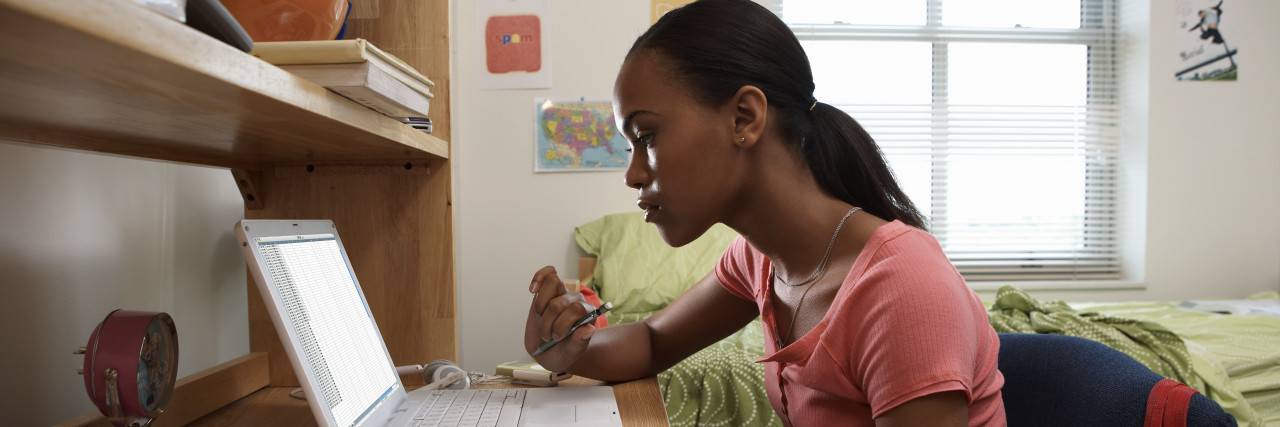I’m applying for academic accommodations right now because I’m just starting graduate school with a chronic illness. During undergrad, I applied for accommodations multiple times, both for housing changes and academic help. Each time it was a slightly different process, but it definitely has taught me how to advocate for myself.
Here are some suggestions if you’re doing this:
1. Advocate for yourself! This is the most important. You are dealing with health challenges that significantly affect your life and the school has a legal responsibility to help you. Don’t forget that, regardless of how complicated the paperwork/conversations might be. It might seem like a hassle, but it is so worth it. Make sure you get what you need.
2. Ask for help before you need it. It’s a lot easier to get professors to work with you if you’re not asking the night before an exam or a paper is due. Sometimes accommodations may require extra work on their part (such as sending you recorded lectures), and the sooner they know about this, the better. Meet with your accessibility office at the beginning of the semester (or before school starts).
3. Make sure you talk with the right people at your school. Schools have a disability accessibility office (or something similar) to help you through this process. Meet with a specialist, preferably someone related to what you’re looking for help with. For example, if you have a chronic illness, don’t go to the person who deals with temporary injuries like a broken arm.
4. Be prepared for your meeting. Some schools will require documentation from a doctor just to schedule a meeting, but make sure you have the paperwork you need. Also, bring (or at least think about ahead of time) a list of what you think would be helpful and of any questions you have for them. It can help to look at your school’s accessibility website or google “accommodations for (your condition)” to see suggestions of what has worked for other people.
5. Ask questions. Accommodations specialists do this for a living. They’ve dealt with many situations before you. They might have suggestions for things that could help someone with your condition; it’s always a good idea to ask.
6. Find doctors who support you. I believe this is really important, both in managing your chronic illness and also for your own mental health. I stayed with doctors way too long who were “experts” in their field, but weren’t always supportive of my decisions. Find doctors you get along with well, who are knowledgeable, and who genuinely want to help you. This will make any paperwork easier. On a related note, be a good patient. You don’t have to do treatments you disagree with, but explain to them why you disagree. Be honest with them about what you’re doing. And be responsible about things like scheduling/canceling appointments. People will always help you more if you help them.
7. If you’re sending a doctor a form to fill out, also attach either your notes for the form or a copy of how you would fill out the form. Often, doctors may not understand exactly how your condition affects school, so it is your responsibility to tell them. For example, I applied for housing with a kitchen because my college was not providing food that was sufficiently gluten-free for celiac disease. When I sent my doctor the accommodations form, I also explained the problems with the food the school provided and why a kitchen would solve these problems.
More recently, as I filled out the academic accommodations for graduate school with chronic fatigue syndrome, I had to ask a new doctor to do the paperwork. He is the best doctor in the world, my new primary care doctor, but I haven’t been in school since we’ve been working together. Even though we talk often and he knows a lot about my symptoms, we’ve never discussed many things that directly affected my academic performance in college. So, when I needed him to fill out paperwork for grad school, I sent a copy of the form with how I would fill it out and told him that he could use it (or not) and ask any questions he had. Most often, I’ve found that when you do this, the doctor will just read over and send the form (maybe with small changes) that you’ve filled out. After all, you are the expert.
8. Talk with your professors. Every school has a different process for this. In some, it is the student’s responsibility to reach out to professors. In others, it is the accessibility office’s responsibility. Make sure you know who will be doing this. If you’re responsible for it, do it as early in the semester as you can. (Wait until you have talked with the accommodations office and have a plan though.) And be honest with your professors — you don’t have to disclose your illness (I usually haven’t, but with some professors I have), but explain the accommodations the school has provided you and how they will affect their class.
9. If you have trouble, ask for help. Maybe you will find out you don’t have enough extra time on tests, or taking tests in an alternative environment isn’t working. When you notice something like this, try to meet with your accommodations specialist to find a solution. If the problem is with the classwork, try to discuss it first with the professor. If this doesn’t work, bring it to the accessibility office. Everyone wants you to succeed; don’t be afraid to ask for their help.
Getty image by James Woodson.

